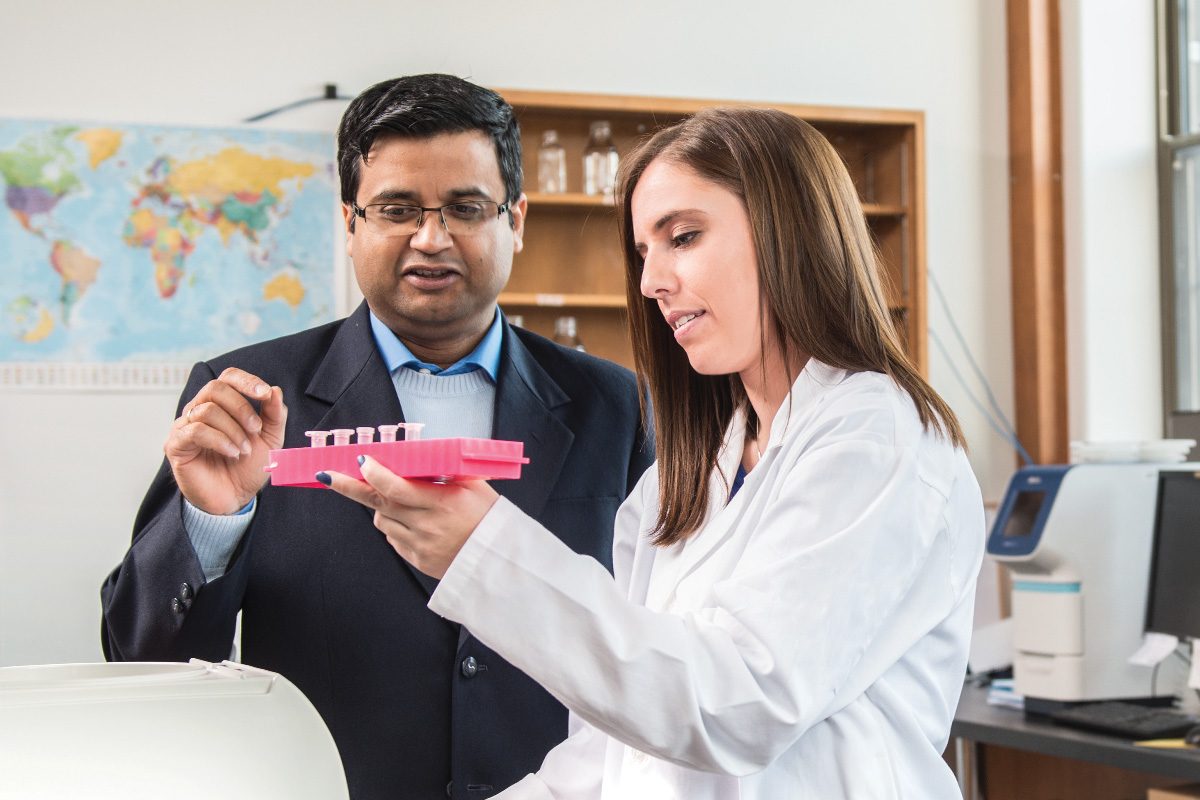
Dr. Ayush Kumar, and Taylor Morriseau.
Back to the future: countering the rise of today’s “Superbugs”
Dr. Ayush Kumar investigates antibiotic-resistant bacteria in water on First Nations reserves
Imagine yourself in the dark days before the discovery of penicillin, when there was no effective treatment for infections such as pneumonia, gonorrhea or rheumatic fever. Back in a time when blood poisoning from a minor cut or abrasion could be enough to cause death, while doctors could do nothing but stand by and hope for the best.
Unlike most of us, researcher and Associate professor of Microbiology Dr. Ayush Kumar doesn’t have to imagine those times. Nowadays, he regularly sees evidence of our slide towards an era akin to the pre-antibiotic age. “It is starting to happen now. A very recent incident [occurred] in Nevada where this woman picked up an infection and the organism … was resistant to all 26 antibiotics, so she ended up dying.”
It is widely recognized by the scientific community that resistance in bacterial pathogens to existing antibiotics is rampant. Once again, minor infections could lead to death. Kumar believes that a better understanding of the molecular mechanisms of antibiotic resistance in bacteria will result in more effective ways to treat these so-called “super bugs”.
Antibiotic resistant bacteria exist right here in Manitoba. Data gathered so far indicates that individuals born on one of our First Nations reserves have a life span ten years shorter than the average Canadian, due in part to bacteria-contaminated drinking water. Gastrointestinal tract infections are rampant, as are HIV and TB. Stories of decades-long boil-water advisories on reserves are commonplace.
“In my opinion,” says Dr. Kumar, “… if it already hasn’t exploded, it is a ticking time bomb. It puts the health of the individuals living on reserves at great, great risk.”
Previous to his arrival in Manitoba, Kumar had been studying antibiotic resistant genes in Lake Ontario. Once at the University of Manitoba, he got in touch with Dr. Annemieke Farenhorst, a professor in the Department of Soil Science, and the Prairie NSERC Chair for Women in Science and Engineering who had been working in First Nations communities. Together, Kumar and Farenhorst realized that no one had been working specifically on the prevalence of resistance genes in water on reserves. A quest was born.
Last summer, Dr. Kumar’s and his team were joined in their search for understanding by First Nations student Taylor Morriseau, who had previously taken his course on “Mechanisms of Microbial Disease”. Morriseau (a fifth year Science student with a double major in Microbiology and Genetics) was so impressed with Kumar’s course that she sought out and secured a four-month term in his lab.
“To this day, [Dr. Kumar] is the only professor that ever openly discussed current issues in drinking water that Canadians and particularly First Nations people face … I wanted to know more.”
Morriseau confesses she was shocked to hear that a lack of clean drinking water was still a problem in Canada in this day and age. She quotes Dr. Marcia Anderson-DeCouteau, whose TedX UManitoba talk on indigenous health and healthcare gaps Morriseau attended in 2016:
“… these gaps [in healthcare] are not the full hope of our ancestors and we will not allow it to be another seven generations before we are as healthy as the people we agreed to share this land with.”
In Anderson-DeCouteau’s words, Morriseau finds inspiration to continue spreading the word about what she learned in the Kumar lab, and the challenges still faced by First Nations people living on reserves.
Morriseau says “…The thing about this project is that it never stops, in terms of advocating and talking about it. Taking the things that I have learned and sharing them with everyone who will listen… At the end of the day, we need people to listen, and to act.”
To date, Kumar’s research findings indicate that simply having a water treatment plant on reserves is not enough. Tests from the first reserve studied show that contamination occurs somewhere in the distribution system, between the plant and inside each home. It isn’t enough to say that if a reserve has a water treatment plant, the residents are safe. Kumar’s study has now expanded from one reserve to four. He has applied for another grant to cover the costs of more testing, with the goal of determining the exact location of the contamination, as well as how to eliminate it.
Says Kumar: “There have been studies in the past which have shown that water from some of these communities can be highly contaminated… I don’t think our findings should surprise anyone. The bottom line is … if we can’t provide [First Nations people] clean drinking water, nothing is going to work.”
To find out more about Dr. Kumar’s research, please visit www.ayushkumarlab.com






